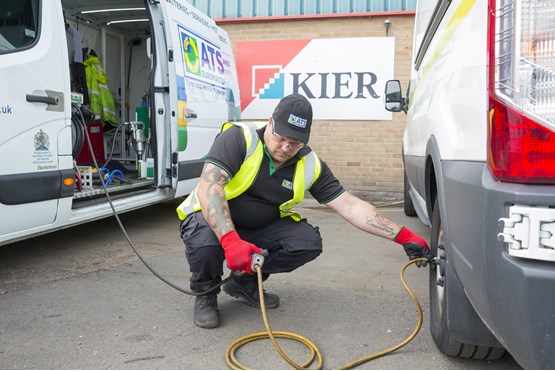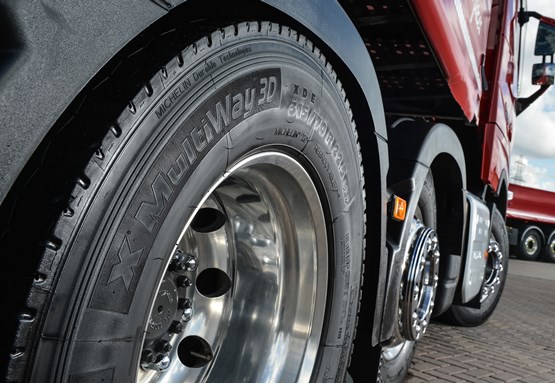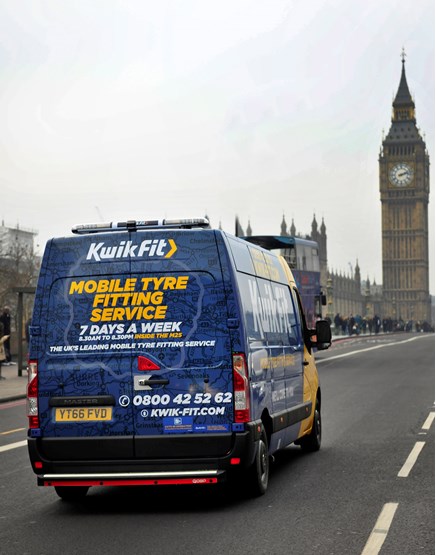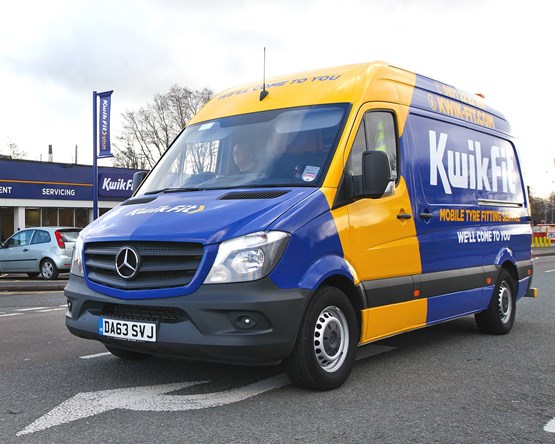John Lewis speaks to industry professionals to offer fleets some guidance and asks which is best, cheap upfront or longer life?
Fleets need to keep a tight grip on operating costs – and that includes expenditure on tyres.
In most cases, van fleets acquire them on a pay-as-you go basis with major operators having direct deals with the tyre manufacturer.
The tyres are usually supplied through – and fitted by – a nominated service provider who will be involved in the negotiations and look after their maintenance under contract.
“The major leasing companies favour a price-per-vehicle-per-month arrangement, however,” says Kwik Fit fleet sales director, Andy Fern (below).

More predictable costs
Calculated with an eye to likely mileage and wear rate among other factors, the fixed monthly figure covers everything – tyre maintenance as well as any tyres that may have to be fitted – and makes costs more predictable.
It also makes it easier for lessors to quote their clients a rate for contract hire with maintenance.
“There is certainly an appetite for price-per-vehicle and pence-per-kilometre (ppk) agreements because they help you predict your monthly expenditure and may be the best bet if you have budgetary and cashflow issues you have to address,” says ATS Euromaster head of commercial sales, Matt Quenby. “Bear in mind, though, that they are not the cheapest options.”
That is because whoever is providing the agreement will build in a financial safety net to ensure they do not lose money on the deal. So, from the fleet’s viewpoint, peace of mind and predictability come at a price.
Also covering maintenance and replacement tyres, ppk agreements are more likely to be chosen by truck rather than van fleets.
Major truck fleets, too, are likely to deal direct with the tyre makers, with service providers doing the donkey work.
Truck ppk deals include a whole raft of measures designed to extend the lives of what are expensive items.
They include regrooving – which has the added benefit of reducing rolling resistance – and retreading as well as twinning tyres and turning them on rims.
“The latter isn’t possible so far as van tyres are concerned because they’re directional,” Quenby says.
“Because we want to maximise truck tyre life we reward our technicians, not for the number of tyres they change, but more for the number that are regrooved and retreaded,” he adds.
“Bear in mind that whereas a new premium truck tyre can cost from £300 or more, regrooving it only costs around £30.”
Michelin Solutions North Europe commercial director Paul Davey (below) contends that ppk agreements can be more cost-effective than buying tyres outright and attempting to manage them in-house.
“In that situation, too many truck tyres are being replaced prematurely, often for the sake of convenience, because a truck or trailer happens to be in the workshop,” he says. “This has a direct impact on the operator’s bottom line, wasting valuable tread depth and cutting a tyre’s life short.”
Michelin Solutions offers a tyre management programme under the Effitires banner. Last autumn, it won a three-year contract with XPO Logistics to manage the tyres fitted to almost 80% of XPO’s 17,000-strong European fleet.

Driving rates lower
Ppk mitigates the impact the higher front-end cost of premium tyres may have on fleet budgets, argues Davey. They last longer than cheaper products, which helps drive ppk rates lower.
Refuse collection vehicle operators who collect waste and transport it to a landfill may favour a price-per-vehicle-per-month deal rather than a ppk arrangement, however, he says.
They cover a comparatively-low mileage and may feel ppk is not suitable for them. But the nature of the work they do means the tyres lead a hard life, so they still want a degree of budget predictability.
“Price-per-vehicle is always a tricky area because you really need to have the data to base it on and that’s easier with trucks used on fixed routes,” says Greg Ward, commercial sales director at Bridgestone.
Van or truck, a service contract encompasses the removal and replacement of damaged or worn-out tyres, pressure and tread-depth checking, watching out for uneven patterns of tread wear, signs of damage and ensuring that valve caps are intact and in place. The better the maintenance, the longer the tyres will last, which will bring operating expenditure down.
Truck fleets are attuned to this proactive approach and usually apply it to any vans they may operate, says Goodyear Dunlop national account manager for fleet David Morris.
Car fleets that also run vans are less likely to do so, he suggests, adding that there may be more of a need to develop van-specific support packages for them to use given the numbers of light commercials used on home delivery work.
Van tyres are seldom retreaded, but Continental-owned Bandvulc produces several thousand a year alongside its truck tyre range.
“The main problem with van retreads is obtaining casings that haven’t been damaged,” says Continental commercial fleet sales manager Tony Stapleton.
Casings can fail because pressures aren’t maintained. “That’s vitally important when it comes to maximising tyre life,” says Fern.
Relying on an onboard TPMS (tyre pressure monitoring system), where fitted, is not sufficient, warns tyre safety charity TyreSafe. Physical pressure checks are necessary also.
How can you be sure your service provider is fulfilling its side of the contract? “We have an audit team that carries out spot checks,” says Stapleton.
Involved in street cleaning, recycling and waste collection among other activities, Kier Services signed a contract with ATS Euromaster last autumn which means the latter now supplies, fits and manages all its tyres.

Regular inspections
The agreement includes regular fleet inspections under the MasterCare banner. Once inspections are completed, ATS Euromaster provides Kier Services with an electronic report detailing tyre condition, any immediate work carried out and recommendations for future action.
Kier runs 214 vehicles ranging from 3.5-tonners to 32-tonne refuse collection vehicles.
“The proactive approach to tyre management that has been adopted is already allowing potential tyre issues to be spotted before they become serious, helping to protect our fleet from unscheduled downtime,” says Kier Services head of fleet and plant Darren Judd.
“The amount of information we get from ATS’s monthly reports provides us with complete control over our tyre spend,” he continues.
“We can identify very quickly how well a particular vehicle’s tyres are performing and whether we need to carry out any additional driver training, or address operational issues to help prolong tyre life.”
Reports play a key role in enabling fleets to control costs.
Fern says: “The reports Kwik Fit produces show how many tyres we’ve changed during the month in question, which brands we’ve fitted, if we’ve fitted brands that are other than the fleet’s policy and the reasons why tyres were changed. Was it damage or was it wear?”
If the wear pattern was irregular then that may mean there is a wheel alignment problem that needs addressing.
In February, demolition and asbestos removal specialist Lexia Solutions Group renewed its tyre supply, fitting and maintenance contract with ATS.
It involves ATS technicians visiting Lexia depots every six weeks to carry out tyre inspections and recommend suitable courses of action.
The customer benefits from consolidated monthly invoicing intended to reduce the administrative workload. Lexia’s fleet numbers 350.

Tyre-fitting on your drive
Light commercials do not have to be driven to a workshop to have their tyres changed. Kwik Fit has 650 depots, but also offers a centrally-managed mobile fitting service using a 200-strong van fleet.
This capability recently helped the company regain an exclusive contract with British Gas to supply a range of tyre-related services to the utility giant’s 12,500 vans. It will do so for the next three years.
Last year Kwik Fit launched Mobile7 within the M25 and has subsequently rolled it out across other regions of the UK including the West Midlands and the north west of England.
It operates 8.30am to 8.30pm, seven days a week, and fits tyres on customers’ drives.
“What we can always do if a company’s mobile engineers get together for a monthly team meeting is inspect the tyres on their vans while they’re busy and change any that need changing,” Fern says.
“We can bring some tyres with us because we’ll already know the size and make that will be needed,” he adds.
“If we don’t have what’s required then the size of our network means there will be a Kwik Fit centre not too far away that will have it in stock.”
Some van fleets that adopt a pay-as-you-go approach may be tempted to specify budget-brand tyres, the argument being that their tyres suffer regular damage anyway, so they may as well opt for something cheap.
It is a false economy, Fern contends, because, unlike premium tyres, cheap tyres are unlikely to be able to stand up to being repeatedly scraped against and driven over kerbs.
“A budget van tyre tends to be a scaled-up car tyre while a premium van tyre is more like a scaled-down truck tyre,” he says.

Morris agrees. “Premium van tyres are better able to resist damage than budget tyres,” he says.
Ward adds: “If you go the budget tyre route then you will end up replacing a lot more of them so it may turn out to be more expensive in the long run.”
Premium tyres such as Michelins do not come cheap, so van operators have to strike a balance.
As a consequence, they may elect to opt for mid-range brands that offer many of the benefits of top-drawer products, but do not cost as much.
“While the fastest-growing sector of the truck tyre market is Tier 4 – the cheapest in other words – there is a lot of interest in Tier 2,” says Quenby; one rung below the top-of-the-range brands in other words.
“When I say Tier 2 I’m thinking about names such as BF Goodrich (a newcomer to the UK truck sector) and Taurus for example,” he says.
However, while these mid-range brands provide many of the benefits of Tier 1 tyres, but at a lower price, tyre manufacturers with premium brands will not lose business without a fight.
Michelin, for instance, offers a guarantee against the financial risk of accidental damage with its X Works and X Multi products. If damage occurs before the tyre is 50% worn, a refund is offered based on remaining tread depth.
Teams promoting second-string brands are not prepared to be walked over either.

Not a premium brand, but eager to get itself established in a hard-fought market, BF Goodrich is offering a 100% Satisfaction Guarantee.
If a truck operator is not fully satisfied with its products then they can be returned up to 100 days after they were fitted in exchange for a refund that reflects the value of the remaining tread depth.
“The procurement teams that do much of the buying for companies that own fleets tend to look at the front-end unit price of tyres though,” Quenby says.
Tyre prices have been edging upwards as sterling has fallen against the euro. Continental, for example, implemented a 4% increase in February while Bridgestone put its truck tyres up by 5% last year.
Budget truck tyres imported from China could face a price increase if an investigation implemented by the European Union concludes they are being ‘dumped’, with the possibility that any import duty imposed could be back-dated.
Singapore-based Giti makes truck tyres in China and has factories in Indonesia and also the USA. Its UK sales and marketing director Tony McHugh is clearly concerned that it could be hit by tariffs.
However, he believes that would be unfair.
“We position ourselves as a mid-range rather than a budget brand and we certainly don’t dump tyres,” he says. “Our retreads are made in the UK and we run our own breakdown network here, too.”
Tyres from Indonesia
If tariffs are applied then Giti may opt to source truck tyres from Indonesia if the figures stack up, he says.
So, might truck fleets that have bought Chinese tyres be pursued for back duty if tariffs are imposed? “I would very much doubt it,” McHugh replies.
It is far more likely that the importers and wholesalers will be obliged to pay up.
Slapping on tariffs would doubtless be viewed as good news by European tyre makers given the inroads budget truck tyres have made into their markets, but might not be welcomed by transport fleets eager to hold down front-end expenditure.
They may, understandably, fear that import duties will ultimately result in everybody’s prices being driven upwards; and that they will end up footing the bill.


















Login to comment
Comments
No comments have been made yet.